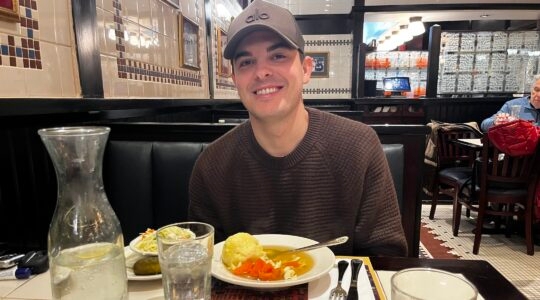The central character in the newest novel by Thane Rosenbaum — lawyer, law professor, author, moderator of an annual discussion series at the 92nd Street Y — is a 12-year-old daughter of divorced parents who shuttles between mother and father via the Brooklyn Bridge. The granddaughter of a Holocaust survivor, she learns about her grandmother’s wartime experiences while juggling such issues as homelessness and 9/11, divorce and fashion.
Is “The Stranger Within Sarah Stein” (Texas Tech University Press) a “tween” book?
Definitely not, Rosenbaum says.
“I don’t define it as a young adult novel,” Rosenbaum says, though the Barnes and Noble and amazon.com websites say it’s for readers 8 years old and above, and the book’s title identifies it as “Fiction/Young Adult.” “It’s a novel that just happens to have a 12-year-old narrator.”
A narrator, that is, who is unfailingly articulate, spouting similes like a fountain, such as when she describes her bifurcated self in gym class: “The skateboarding Manhattan Sarah ran like a gazelle and played dodgeball like an alley cat. The Brooklyn Sarah was a complete spaz, running with arms flailing in the air as if she was drowning in water.”
“I certainly didn’t dumb [the novel] down … for younger readers,” Rosenbaum says.
Think Alice in Wonderland (an adult novel in the guise of a kid’s story), not Harry Potter (whose magic-centric tales also attracted an adult readership).
In his earlier, clearly adult-oriented works of fiction set in a Holocaust context (“Second Hand Smoke,” “The Golems of Gotham” and “Elijah Visible”), Rosenbaum dealt with the themes of “brokenness” and the obligation to remember. In “The Stranger Within Sarah Stein,” he puts those themes to work but in a more contemporary vein.
This time, the Shoah is still there. With, again, ghosts as a metaphor for loss. It’s a breezy book with a serious message: “Everyone is a stranger to himself,” the author says.
Rosenbaum, 52, who lives in Manhattan, is the son of Holocaust survivors. His daughter, Basia Tess Rosenbaum, a 16-year-old student at Hunter College High School, was 12 when he wrote “The Stranger Within Sarah Stein.” Like Sarah Stein, Basia Tess travels between parents via the Brooklyn Bridge, her mother in Brooklyn, her father in Manhattan. Thane’s parents, born in Poland, were Holocaust survivors.
Is the novel autobiography?
Definitely not, Rosenbaum says. Though the book centers around a precocious, street-smart tween and her parents, it’s not his story. Or his daughter’s.
Basia Tess differs.
“All my Dad’s books are autobiographical,” she says, sitting at his side one recent afternoon at the living room table of his apartment near Central Park.
She’s clearly the model for Sarah Stein, but she’s not Sarah Stein, says Basia Tess, who writes the “The Buzz” weekly roundup of local cultural events for The Jewish Week Arts Guide. “Sarah Stein is me on a good day. I’m not as smart as Sarah Stein.”
Thane listens quietly.
Rosenbaum offers some caveats about this book and its “fractured narrative.”
It’s not a Holocaust novel, he says. There are no scenes of concentration camps or ghettos. Born after World War II, he approaches the subject as a member of the Second Generation. “It’s a post-Holocaust novel.”
It’s not pure fantasy, though it incorporates people and places that disappear. Rosenbaum’s description of life (and death on 9/11) here are realistic. “It’s a very New York novel,” he says, honed from extensive, hands-on, in-person research. “All [my] books are a blend of reality and unreality.”
He chose to write through the eyes — and in the words — of a tweener to bring a fresh perspective. Who better to talk about the feelings of a child of divorce than a child herself? “I wanted the book to be relevant to children of divorce.”
It’s an adult book, but he’s says he’s received insightful questions from elementary school students who are reading it.
Rosenbaum leaves several questions unanswered. Will Sarah’s separated parents reunite? Were her experiences a figment of her imagination? Do the central characters learn any lessons from what they have gone through?
These untied ends are intentional, he says. “I’ve never written anything that has a real, unambiguous happy ending.”
E-mail: steve@jewishweek.org
The New York Jewish Week brings you the stories behind the headlines, keeping you connected to Jewish life in New York. Help sustain the reporting you trust by donating today.




